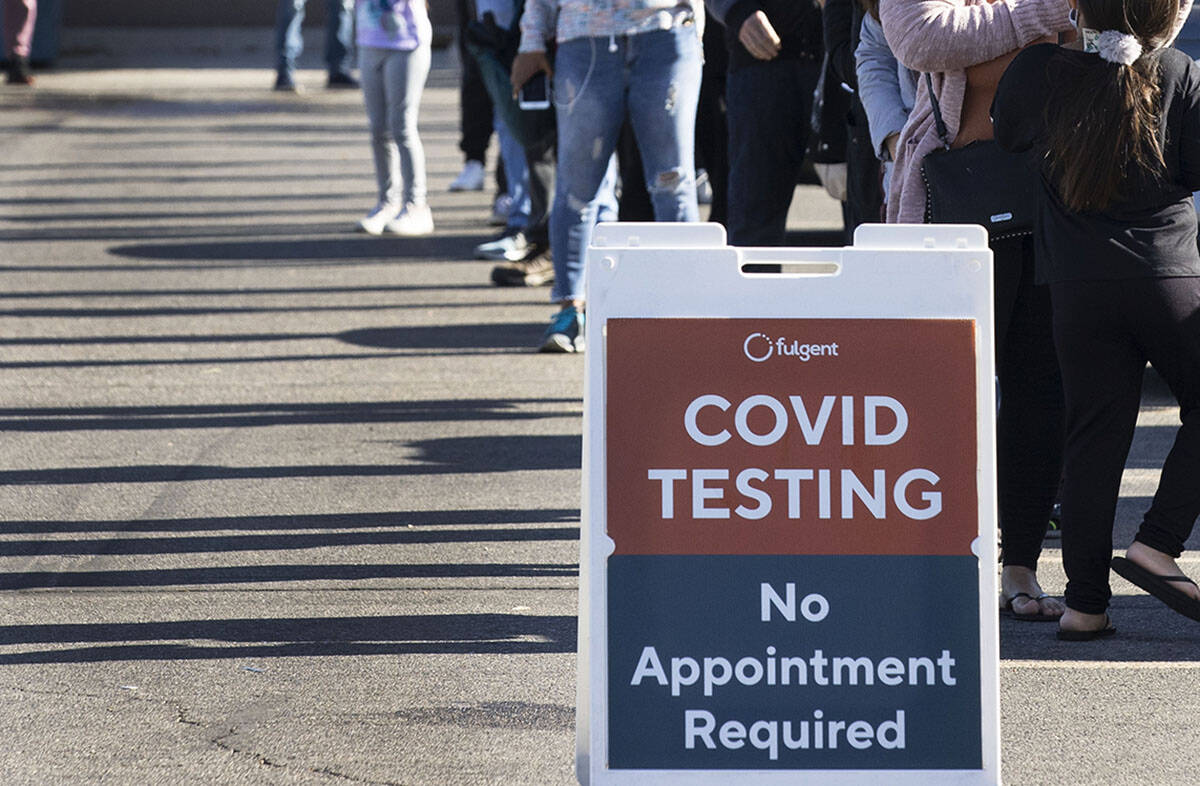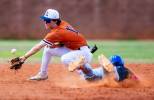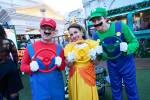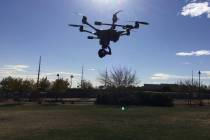As coronavirus persists, some experts say we must learn to coexist
Last year’s optimism that the world might vanquish the new coronavirus has been replaced in 2022 with a growing resignation that it is here to stay.
“This virus is not going away,” Amy Stone, an assistant professor and infectious disease researcher at Touro University Nevada in Henderson, said on Thursday. “It’s something that we’re going to have to learn to live with.”
Still, there continues to be reason for optimism. Many scientists believe that the virus may increasingly result in less severe disease as more people develop immunity through vaccination and prior infection, even as it continues to evolve. Some predict that it may become like a seasonal flu, continuing to cause large, but more acceptable, numbers of cases, hospitalizations and deaths each year.
But the virus has proven to be anything but predictable, making it tricky to forecast how much havoc it will wreak in the weeks ahead, let alone the year.
“Everyone’s crystal ball is a little bit cloudy,” said Dr. William Schaffner, a professor at Vanderbilt University and a national authority on infectious diseases.
The omicron wave
“My cautious optimism has been challenged twice before,” Schaffner said Thursday. “First in the summer as cases were going down — and then along came delta. Just as we were getting our arms around delta, along came omicron.”
He and other health authorities are bracing for increasing numbers of cases, hospitalizations and deaths throughout January and possibly into February. The omicron wave of the disease is expected to subside at that point, he said, though possibly starting at different times in different parts of the country.
“Many scientists anticipate after this wave, we could get a break for a while,” said Julie Swann, a professor at North Carolina State University and a pandemic researcher.
This is in part because of a growing proportion of the population developing some degree of immunity to the virus either through vaccination or infection, even if the “herd immunity” that scientists once thought would end the pandemic is unobtainable.
If no new variant of concern emerges in the coming weeks, the drop in cases seen in South Africa, where omicron was first spotted, could also occur in the U.S., Schaffner said.
But Swann believes we could see another wave of disease, triggered by yet another dangerous variant, six months after the omicron wave recedes.
There also is hope — but no guarantee — that the virus will evolve in ways that produce milder forms of disease, even if it spreads more easily.
“I think overall the virus is moving toward less severe illness,” Stone said. “The most successful viruses don’t kill the person that’s infected with them,” but instead keep the host alive and able to spread infection and possibly become reinfected.
Dr. Paul Offit, an infectious disease doctor at Children’s Hospital of Pennsylvania and a national authority on vaccines, expects the new coronavirus to begin behaving more like other coronaviruses, several of which result in the common cold.
“All coronaviruses to date — and this is the ninth one — are essentially winter viruses,” including four in humans that circulate in the U.S. every winter, he said. The new coronavirus may also become a bug that flourishes primarily in the winter.
Coexisting with the virus
Many authorities predict a return to greater normalcy beginning in the spring, even as certain behaviors of the pandemic remain.
“I believe that we’re going to take some of the things we learned from the pandemic and perhaps integrate them in our lives,” Swann said. These behaviors might include continuing to wear masks when sick or in a higher-risk environment.
Stone, the Touro University researcher, believes that masking and social distancing won’t go away for good but might be “put on the shelf” at times when disease numbers are down.
Dr. Fermin Leguen, district health officer with the Southern Nevada Health District, said he does not foresee Southern Nevada returning to earlier pandemic restrictions, such as virtual schooling, limitations on gathering sizes or business closures.
“We have to keep in mind also that at the time of those restrictions, we didn’t have vaccination, or the vaccination campaign was in the very earliest stages,” he said. “The end of 2021 and the beginning of 2022 are quite different from 2020. So we haven’t even entertained the idea of enhancing the restrictions in the community in terms of social life or business.”
As for closing schools, “We have a lot of concerns regarding virtual learning, especially for elementary, middle or high school, because we have seen already the negative impact that it had in the life of those children,” especially on their mental health, Leguen said.
Swann said a return to greater normalcy also will be predicated on an ability to pivot in the face of new challenges, such as a dangerous new variant. For example, the U.S. needs to shore up its testing capacity and overall public health infrastructure, she said.
Las Vegas may face some unique challenges in curbing the virus, according to Stone.
“We have so many visitors coming in, there’s more chances to infect our local population, to find a (virus) mutant that escapes the immunity that we have built up as a community,” she said.
“I think that’s going to be Las Vegas’s challenge: to maintain our draw for tourists, but also maintain the safety of both those tourists and our local community.”
Medical strides
Coexisting with the virus also will become easier with medical advancements, including new antiviral treatments not yet widely available, Leguen said.
Schaffner agrees. “Our scientific research enterprise has been absolutely sterling throughout COVID,” he said, including the development of diagnostic tests, therapies and vaccines in a relatively short period of time. “Many, many more patients now leave the hospital with a prospect for a reasonably healthy life, even though they’ve been very, very sick.”
Despite this, he said, there continues to be unfounded distrust of some of the fruits of the scientific endeavor, especially the vaccines.
Schaffner blames the distrust on poor science education in the U.S. as well as confusing communication by those in positions of power.
“I think we really have to embrace the products of science if our society is going to benefit from these advances,” he said.
Contact Mary Hynes at mhynes@reviewjournal.com or 702-383-0336. Follow @MaryHynes1 on Twitter.




























